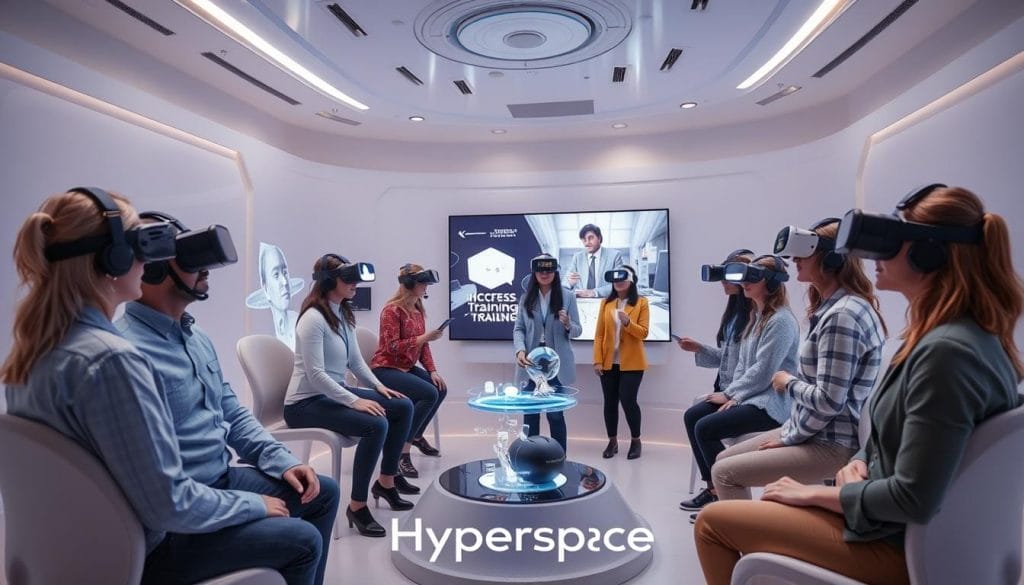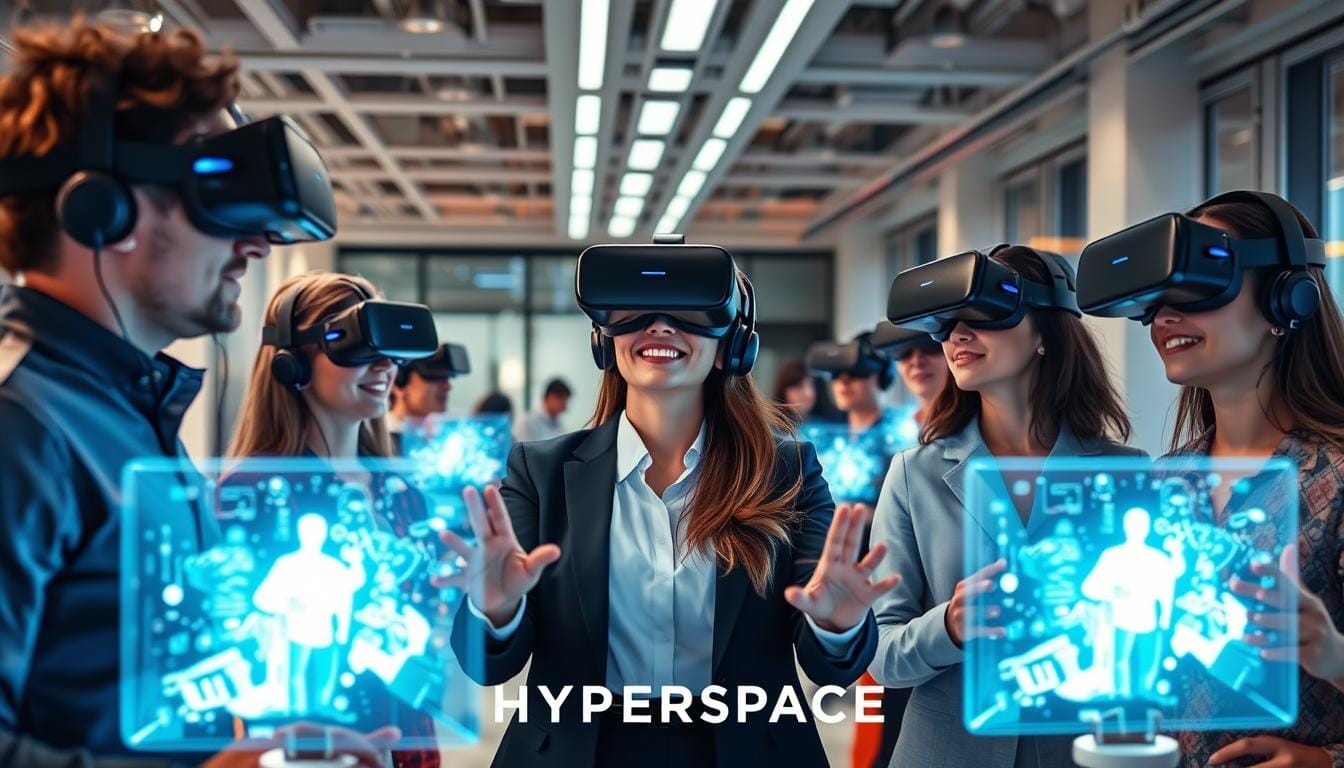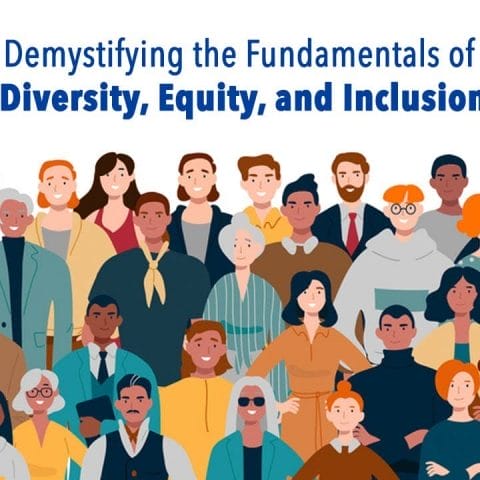Virtual reality (VR) has changed how we learn soft skills in many fields. It creates interactive and immersive worlds. This makes learning more than just reading or listening.
This article will show how VR can help you succeed in your career. It focuses on improving your communication and teamwork skills. Hyperspace, our VR platform, works on many devices. You don’t need special hardware or apps to start.
Key Takeaways
- Virtual reality (VR) technology has revolutionized soft skills training by providing immersive and interactive learning environments.
- VR training offers a more engaging and personalized experience compared to traditional learning methods.
- Developing soft skills through VR can enhance your professional success, job satisfaction, and career prospects.
- Hyperspace, a VR-ready platform, provides seamless access to transformative soft skills training experiences on various devices.
- VR training increases confidence, retention, and the transferability of skills to real-world situations.
The Power of Virtual Reality in Soft Skills Development

Virtual reality (VR) has changed how we learn soft skills. It offers a more engaging and immersive experience. Learners can practice their skills in real-like scenarios.
By stepping into virtual worlds, people can work on skills like communication and problem-solving. This method boosts confidence and helps skills stick in real life.
Immersive and Interactive Environments for Effective Learning
The VR market is expected to hit over $57 billion by 2027. This shows VR’s big impact in many areas. A LinkedIn report found 92% of talent pros think soft skills are key when hiring.
- VR can make people 70% more confident in talking, showing its power in improving communication.
- VR empathy training boosts emotional intelligence by a lot, making it a game-changer.
- VR team sessions improve communication and problem-solving by 30%, showing its team benefits.
VR training can make learning stick by up to 75% more than old methods. This proves VR’s worth in teaching important soft skills.
“The integration of VR capabilities with learning management systems, such as those offered by platforms like Vorecol Learning, provides organizations with the tools to track progress and outcomes in VR training programs.”
VR makes learning soft skills safe and fun. It helps people grow in their careers and personally.
Understanding Soft Skills and Their Importance

In today’s fast-changing work world, having strong soft skills is key to success. Soft skills include personal traits and teamwork abilities that help with communication, problem-solving, and leadership. These skills are useful in many jobs and help you do better at work, feel happier, and move up in your career.
Skills like listening well, being flexible, and managing time are vital in today’s workplace. Employers see the value of soft skills because they help people work well together, solve problems, and build strong relationships.
Unlike specific job skills, soft skills are the heart of interpersonal skills, communication skills, leadership skills, and teamwork. Growing these skills makes you more employable and helps you understand and connect with others. This is key to doing well in your job.
| Soft Skill | Importance |
|---|---|
| Communication | Good communication is key for teamwork and solving problems. |
| Problem-Solving | Being able to solve problems creatively and efficiently is valued. |
| Adaptability | Being able to adapt to change is crucial in today’s fast-paced work world. |
| Teamwork | Working well with others is essential for success. |
| Leadership | Showing leadership skills, like making decisions and motivating others, is desirable. |
By understanding and improving soft skills, you can set yourself up for success and growth in your career. In a competitive job market, having a mix of technical and interpersonal skills opens doors to new opportunities and drives innovation.
Virtual reality soft skills training: The New Age of Learning
Advantages Over Traditional Training Methods
Virtual reality (VR) training is more immersive and interactive than old-school learning. Classroom lectures and role-playing are good for basics, but VR is different. It lets people dive into real-life scenarios and get feedback right away.
This hands-on method helps keep skills sharp and boosts confidence. It also lets everyone learn at their own pace, making it better than traditional methods.
Studies show VR training makes learning more engaging. People learn four times faster with VR than in a classroom. Companies using VR see a 10% boost in remembering what they learned.
| Advantage | Impact |
|---|---|
| Immersive and interactive learning | Boosts skill retention and application confidence |
| Personalized and consistent experiences | Addresses limitations of traditional training |
| Faster learning and higher engagement | 4x faster learning and 10% higher information retention |
The global VR market for soft skills training is expected to hit $6.7 billion by 2025. This shows how much organizations value this new way of learning.
The Versatility of VR Soft Skills Training
Virtual reality (VR) soft skills training is a flexible solution for many industries. It’s used for culture and new hire onboarding, customer service, and manager training. VR changes how we learn soft skills.
VR makes real workplace scenarios for practice. It’s safe and controlled. This lets companies make VR soft skills training programs for specific needs. Employees get the skills to do well and help the company succeed.
| Industry | VR Soft Skills Training Applications |
|---|---|
| Healthcare | Empathy training for healthcare professionals, bedside manner simulations |
| Manufacturing | Safety protocol training, team collaboration exercises |
| Retail | Customer service scenarios, conflict resolution practices |
| Finance | Negotiation skills development, communication workshops |
| Transportation | Distracted driving awareness, emergency response training |
The versatility of VR soft skills training lets companies make customizable training programs. They meet diverse use cases and workforce needs. With VR’s immersive and interactive nature, companies prepare employees for today’s fast-paced business world.
“VR training can save costs by eliminating expenses for travel, external trainers, and reducing administrative costs.”
Culture and New Hire Onboarding in VR
Companies are using virtual reality (VR) to make onboarding better and faster. VR lets new hires explore a virtual workplace that feels real. This helps them understand their role and the company’s values better.
Accelerating Cultural Assimilation and Role Preparation
New employees get to know the company’s culture through VR. They can walk through virtual spaces that look like the real workplace. This way, they learn about the company’s rules and how things work every day.
VR training makes employees more confident in using what they learn. Companies that use VR for onboarding keep more employees and spend less on training.
VR helps new hires get ready for their job faster. This leads to a more engaged and loyal team.
“The study by the Brandon Hall Group found that organizations with a strong employee onboarding process improve new hire retention by 82% and productivity by over 70%.”
VR onboarding has many benefits. It makes learning fun and interactive. It also lets people practice skills safely and learn better.
- Faster learning curve and increased engagement through interactive experiences
- Safe practice environments for skill development without real-world consequences
- Improved information retention and application of knowledge
- Customizable learning experiences tailored to individual needs and preferences
- Seamless remote onboarding capabilities, bridging the gap for distributed teams
VR makes onboarding more immersive and effective. It helps new hires feel part of the team from the start. This sets the stage for success and growth.
Enhancing Customer Service Through VR Simulations
Exceptional customer service is key for any business to succeed. Virtual reality (VR) training is a powerful tool to boost these skills. It lets customer service reps practice in different scenarios, like dealing with angry customers or solving tough problems.
VR training uses realistic virtual settings to teach important skills like listening, communication, and problem-solving. This way, trainees can learn without facing real-life risks.
This hands-on method makes customer service reps more confident and skilled. Learners keep up to 75% of what they learn in interactive, immersive settings, compared to 20% with traditional lectures. Companies using VR see a 75% boost in information retention, showing VR’s effectiveness.
VR training also helps build empathy among customer service reps. By simulating various customer scenarios, they can understand customers’ feelings and needs better. This leads to more personalized and caring service, making customers happier and more loyal.
VR training offers a safe space for interactive customer scenarios. It helps customer service pros improve their communication skills development without fear of real-world mistakes. They can learn from their errors and keep getting better at serving customers.
“VR training has been successfully implemented by major retailers like Walmart to enhance customer service skills, resulting in higher customer satisfaction scores and more knowledgeable employees.”
As the need for top-notch customer service grows, VR training will be crucial. It will help customer service teams develop the skills needed to succeed in today’s competitive market.
Building Emotional Intelligence and Empathy in VR
In today’s fast world, empathy and emotional intelligence are key. Virtual reality (VR) is a new way to improve these skills. It lets people experience real-life scenarios in a virtual world.
This helps them understand others better. It’s great for work, making communication and teamwork better. VR can also make workplaces more caring and inclusive.
Stepping into Different Perspectives for Better Understanding
Studies show VR can really help with empathy. At the University of Maryland, people who used VR to learn about emotions understood them 31% better. At PwC, VR training helped people remember what they learned 75% more than usual.
Stanford University found VR made people feel 92% more ready for emotional talks. A VR program for helping the homeless made people 65% more likely to help within six months.
“VR training can be a game-changer in developing emotional intelligence and fostering a more empathetic work culture. By stepping into different perspectives, individuals gain a deeper understanding of diverse experiences, ultimately leading to more effective communication and stronger relationships.”
VR is a powerful tool for building empathy and emotional intelligence. As we focus on these skills, VR training can change how we learn and grow. It’s a new way to connect in our digital world.
Discover how VR empathy trainingcan boost your career
Preparing Managers for Effective Performance Reviews
Effective performance reviews are key for employee growth and company success. Virtual reality (VR) training helps managers prepare for these important talks. It lets them practice in real-life scenarios, improving their listening, giving feedback, and empathy.
Managers can see how they communicate in VR. They learn where they can get better and how to give better feedback. This training helps them support employee growth, making the company stronger.
| VR Training Benefit | Impact |
|---|---|
| Employees in VR-intensive training programs learn four times faster than in traditional classroom settings. | Accelerated skill development for managers. |
| Employees in VR-intensive training programs are 275% more confident in applying their skills. | Increased managerial confidence in conducting effective performance reviews. |
| Organizations implementing VR training saw an 80% reduction in training time. | Efficient and cost-effective VR manager training. |
| Companies incorporating VR into managerial development programs experienced an average productivity increase of 20%. | Improved organizational performance through enhanced performance review preparation. |
Using virtual reality, companies can help managers give better performance reviews. This creates a culture of ongoing improvement and employee growth.
“VR training can increase retention rates by up to 75% compared to traditional methods.”
Creating Safe Environments for Skill Practice
Virtual reality (VR) soft skills training offers a safe space for practice. In regular learning, fear of mistakes can stop progress. But VR lets learners try out skills in a safe, simulated world.
They can see how their actions affect others without real-world risks. This low-stakes approach helps them learn from mistakes and grow in confidence. They can then use these skills in real work situations.
Learning from Mistakes Without Real-World Consequences
Skills like listening and empathy are key for good interactions. A study by Elizabeth Baker and Angelique Jenny shows VR can teach these skills. They used it for learning about family issues and more.
VR makes learning safe, so mistakes don’t hurt in real life. This boosts confidence and skill use.
Places like SkillShare Studios use VR for learning. They simulate real-life challenges like child safety. This helps students and professionals get ready for tough situations.
VR training beats old methods, making learners more confident. Managers also feel more ready to use new skills. Plus, VR training cuts down learning time by a lot.
The Future of VR Soft Skills Training
The virtual reality (VR) market is booming, expected to hit $58.1 billion by 2028. This growth brings exciting changes to soft skills training. New tech like artificial intelligence and haptic feedback will make VR training more real and interactive.
Soon, learners will get to practice in super-realistic simulations. They’ll get better feedback and can work with virtual colleagues in real-time. This means companies can give their teams the best tools to succeed in today’s fast-paced world.
A PwC study found VR training for soft skills is 3-4 times quicker than old methods. Companies like Aequilbrium are working with big names to offer top VR training. Ent Credit Union is already seeing great results.
VR training is great for soft skills because it’s flexible and doesn’t require travel. It’s perfect for practicing skills in a safe, judgment-free space. This makes it easier for learners to grow and improve.
The global VR market is growing fast, and VR soft skills training is set to change the game. It offers personalized feedback, better engagement, and is cost-effective. This tech is going to change how we develop the skills needed for success today.
“The utilization of VR training is transforming current business operations, offering faster training with enhanced retention, cost-effectiveness, and personalized training options tailored to individual team members’ needs.”
Conclusion
Virtual reality (VR) is changing how we learn soft skills. It offers a new way to practice skills in a safe space. This method is better than old-school training.
VR lets people try out real-life scenarios in a controlled way. This helps improve customer service and makes workplaces more welcoming. It’s a great tool for many industries.
The perks of VR training are clear. People learn faster in VR than in classrooms. They remember what they learn 80% better than in traditional settings.
VR training boosts confidence in customer service by 40%. It also helps sales go up by 24%. Companies see a 60% jump in employee engagement with VR.
VR is getting better, and so is its role in soft skills training. It can make people more productive and safer at work. VR is set to change how we grow professionally.
By diving into VR, people can reach their career goals. It opens doors to new learning experiences. This could be a game-changer for career development.





